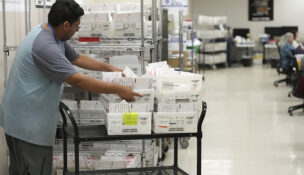Lawmaker looking to outlaw processed school lunches
ggrado//December 9, 2024//[read_meter]
One Arizona lawmaker isn’t waiting for Robert Kennedy Jr. to fulfill his promise to remove artificial ingredients from school lunch programs.
Rep. Leo Biasiucci is crafting legislation that would bar public schools from serving what he calls “ultra-processed foods” to students during the day. That includes not just what is available in the cafeteria but also what can be purchased at snack bars and from school vending machines.

And the Lake Havasu City Republican has a very specific idea of what fits that definition. His proposal includes everything from potassium bromate which is used in making bread to a host of food colorings including Blue # 2 which is a synthetic version of indigo used on baked goods, cereals and candies to Yellow # 6, the dye that gives Cheetos that distinctive color.
Nothing in Biasiucci’s legislation would preclude parents from sending lunches with their children that contain any of the chemicals that the measure would ban. And it apparently would allow such items to be sold at the snack bar at football games as there is an exception for “events held on the school grounds after the school day.”
All this comes amid heightened concern about food additives raised during the presidential campaign by Kennedy and president-elect Donald Trump.
Kennedy will have an outsize role in all of this as the new head of the Department of Health and Human Services.
That is the parent agency of the Food and Drug Administration. More to the point, it is the FDA that decides which additives are considered to be “generally recognized as safe.”
And then there’s the fact that there is precedent for at least some of this.
One of the items on Biasiucci’s list, for example, is titanium dioxide, a food color additive found in baked goods, puddings, frostings and coffee creamers. The European Food Safety Authority has concluded that the chemical is no longer safe in food.
On top of that, many of the companies that manufacture items with these chemicals make a separate version designed to pass European standards.
So while Fruit Loops sold here have Red 40, Blue 1, and Yellow 5 and 6, what’s available in Germany manages with fruit and vegetable concentrates, with the only listed coloring coming from carotene.
Biasiucci told Capitol Media Services on Monday he has been thinking about the issue for some time. That includes a trip to Italy where he began looking at the ingredients in their prepared foods and how they differ from similar products in the United States.
Still, he said, it didn’t get much attention.
“I think now, with RFK Jr. kind of getting in the spotlight and being in the position he is, I think this conversation has finally come to the forefront,” Biasiucci said.
“The timing is perfect,” he continued. “This is now becoming something that people actually are paying attention to.”
But Biasiucci said that, even with the new federal administration, he doesn’t want Arizona to have to wait for the FDA to get around to reviewing and deciding whether to ban these chemicals.
“I just never depend on the federal government,” he said. Biasiucci said this is no different than the state pursuing its own laws on things like human trafficking. “I just don’t want to wait that long.”
And there’s something else.
Biasiucci pointed out that his proposal is far narrower than anything that would have to go through the federal bureaucracy, dealing only with school lunches.
“If we’re providing this food for free to our children, which are the most vulnerable … I want to make sure that the food we are providing them on the government dime is actually safe and it is not something that’s toxic,” he said. “They’re the ones that are growing and need to make sure they’re getting the most nutrients.”
That goal, according to the Arizona School Boards Association, is a good one. And Heidi Vega, spokeswoman for the organization, called what Biasiucci is trying to do “certainly a step in the right direction.”
But there’s a caveat that goes with that.
“It’s essential to ensure there’s sufficient funding and transitional support available to local education agencies,” she said. That funding, said Vega, is “crucial to prevent potential negative impacts on meal accessibility for Arizona’s most vulnerable students.”
Biasiucci acknowledged the financial issue. But he said that there appear to be some options.
During Covid, the U.S. Department of Agriculture set up a program to help states deal with the challenges of supply chain disruptions.
The pandemic is gone. But the agency now is using those funds for “Try It Local” in which schools operating under the National School Lunch Program can be reimbursed for purchasing “unprocessed or minimally processed local or regional produced food” for their lunch programs. Arizona got nearly $4.4 million for the program.
Strictly speaking, the program does not mention artificial dyes or other additives. But the list of items that are eligible would seem to preclude or minimize their use, ranging from fruits and vegetables, to meats, beans and dairy foods such as cheese or yogurt.
Conversely, the program does not provide dollars for things like breaded meats, muffins, cookies, frozen bread and ready-to-heat items like pre-made sandwiches and pizza.
And Biasiucci said even if that program and its funding is shut down, he believes that the feeding of proper meals to students is a higher priority than some of the other things now funded by the federal government.
“We’re spending how many billions, whether it’s Ukraine or in the Middle East or other countries,” he said.
“And we can’t make sure our children are getting safe, non-toxic foods in our lunch programs?” Biasiucci said. “For me, I don’t like that excuse.”
An aide to state schools chief Tom Horne said his boss would like to do some research into the effect of these dyes and chemicals before taking a position.
But Doug Nick said his boss has a history of trying to limit what can be available to kids on campus, noting he was behind rules adopted a decade ago to ban sugared sodas at schools.
There is some precedent for what Biasiucci wants to do. A new California law that takes effect in 2028 bans six specific artificial dyes from meals served at schools.
















